Kafka Architecture
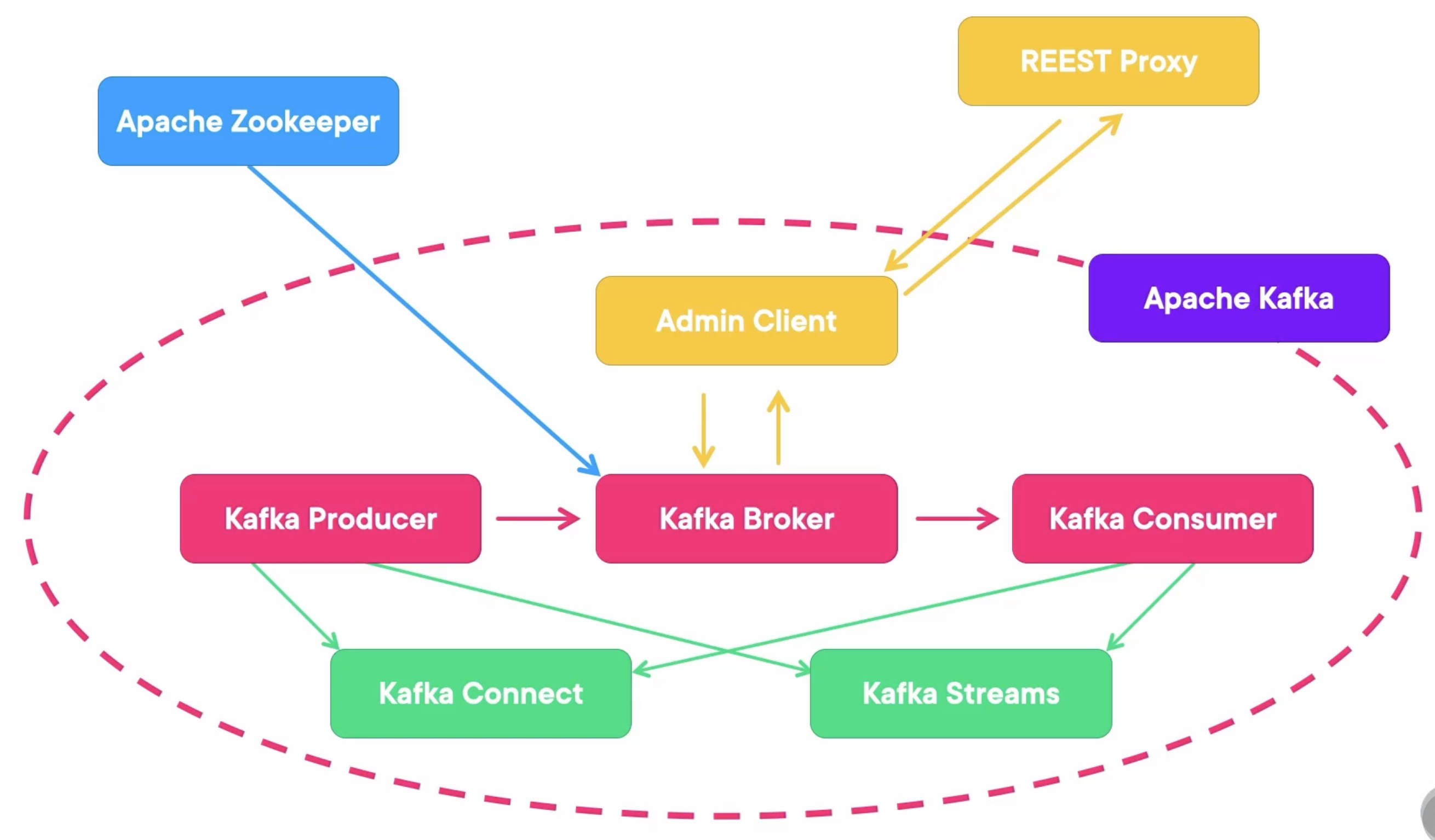
Kafka Message
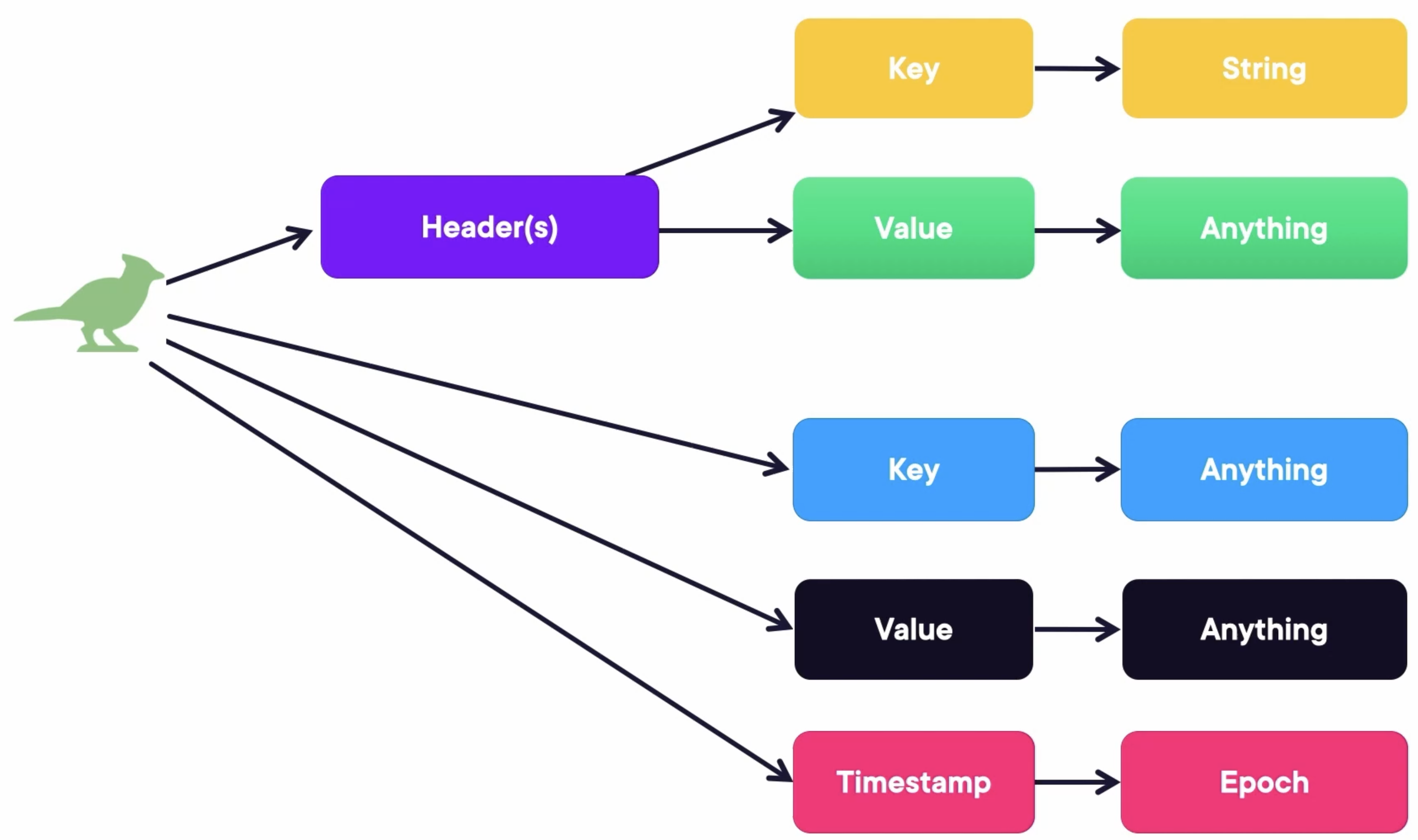
Deploy Kafka
Create a docker-compose file docker-compose.yaml containing three Zookeepers, three Kafka Brokers, and a Kafka REST Proxy:
---
version: '3'
services:
zookeeper-1:
image: confluentinc/cp-zookeeper:7.4.1
hostname: zookeeper-1
container_name: zookeeper-1
volumes:
- ./zookeeper-1_data:/var/lib/zookeeper/data
- ./zookeeper-1_log:/var/lib/zookeeper/log
environment:
ZOOKEEPER_CLIENT_PORT: 2181
ZOOKEEPER_TICK_TIME: 2000
ZOO_MY_ID: 1
ZOO_SERVERS: server.1=zookeeper-1:2888:3888;2181 server.2=zookeeper-2:2888:3888;2181 server.3=zookeeper-3:2888:3888;2181
zookeeper-2:
image: confluentinc/cp-zookeeper:7.4.1
hostname: zookeeper-2
container_name: zookeeper-2
volumes:
- ./zookeeper-2_data:/var/lib/zookeeper/data
- ./zookeeper-2_log:/var/lib/zookeeper/log
environment:
ZOOKEEPER_CLIENT_PORT: 2181
ZOOKEEPER_TICK_TIME: 2000
ZOO_MY_ID: 2
ZOO_SERVERS: server.1=zookeeper-1:2888:3888;2181 server.2=zookeeper-2:2888:3888;2181 server.3=zookeeper-3:2888:3888;2181
zookeeper-3:
image: confluentinc/cp-zookeeper:7.4.1
hostname: zookeeper-3
container_name: zookeeper-3
volumes:
- ./zookeeper-3_data:/var/lib/zookeeper/data
- ./zookeeper-3_log:/var/lib/zookeeper/log
environment:
ZOOKEEPER_CLIENT_PORT: 2181
ZOOKEEPER_TICK_TIME: 2000
ZOO_MY_ID: 3
ZOO_SERVERS: server.1=zookeeper-1:2888:3888;2181 server.2=zookeeper-2:2888:3888;2181 server.3=zookeeper-3:2888:3888;2181
broker-1:
image: confluentinc/cp-kafka:7.4.1
hostname: broker-1
container_name: broker-1
volumes:
- ./broker-1-data:/var/lib/kafka/data
depends_on:
- zookeeper-1
- zookeeper-2
- zookeeper-3
ports:
- 9092:9092
- 29092:29092
environment:
KAFKA_BROKER_ID: 1
KAFKA_ZOOKEEPER_CONNECT: zookeeper-1:2181
KAFKA_ADVERTISED_LISTENERS: HOST://localhost:9092,INTERNAL://broker-1:29092
KAFKA_LISTENER_SECURITY_PROTOCOL_MAP: HOST:PLAINTEXT,INTERNAL:PLAINTEXT
KAFKA_INTER_BROKER_LISTENER_NAME: INTERNAL
KAFKA_SNAPSHOT_TRUST_EMPTY: true
broker-2:
image: confluentinc/cp-kafka:7.4.1
hostname: broker-2
container_name: broker-2
volumes:
- ./broker-2-data:/var/lib/kafka/data
depends_on:
- zookeeper-1
- zookeeper-2
- zookeeper-3
- broker-1
ports:
- 9093:9093
- 29093:29093
environment:
KAFKA_BROKER_ID: 2
KAFKA_ZOOKEEPER_CONNECT: zookeeper-1:2181
KAFKA_ADVERTISED_LISTENERS: HOST://localhost:9093,INTERNAL://broker-2:29093
KAFKA_LISTENER_SECURITY_PROTOCOL_MAP: HOST:PLAINTEXT,INTERNAL:PLAINTEXT
KAFKA_INTER_BROKER_LISTENER_NAME: INTERNAL
KAFKA_SNAPSHOT_TRUST_EMPTY: true
broker-3:
image: confluentinc/cp-kafka:7.4.1
hostname: broker-3
container_name: broker-3
volumes:
- ./broker-3-data:/var/lib/kafka/data
depends_on:
- zookeeper-1
- zookeeper-2
- zookeeper-3
- broker-1
- broker-2
ports:
- 9094:9094
- 29094:29094
environment:
KAFKA_BROKER_ID: 3
KAFKA_ZOOKEEPER_CONNECT: zookeeper-1:2181
KAFKA_ADVERTISED_LISTENERS: HOST://localhost:9094,INTERNAL://broker-3:29094
KAFKA_LISTENER_SECURITY_PROTOCOL_MAP: HOST:PLAINTEXT,INTERNAL:PLAINTEXT
KAFKA_INTER_BROKER_LISTENER_NAME: INTERNAL
KAFKA_SNAPSHOT_TRUST_EMPTY: true
rest-proxy:
image: confluentinc/cp-kafka-rest:7.4.1
ports:
- "8082:8082"
depends_on:
- zookeeper-1
- zookeeper-2
- zookeeper-3
- broker-1
- broker-2
- broker-3
hostname: rest-proxy
container_name: rest-proxy
environment:
KAFKA_REST_HOST_NAME: rest-proxy
KAFKA_REST_BOOTSTRAP_SERVERS: 'broker-1:29092,broker-2:29093,broker-3:29094'
KAFKA_REST_LISTENERS: "http://0.0.0.0:8082"
Run composed containers:
docker compose up -d
When all containers run like this:
[+] Running 8/8
⠿ Network demo1_default Created 0.1s
⠿ Container zookeeper-1 Started 2.6s
⠿ Container zookeeper-2 Started 2.5s
⠿ Container zookeeper-3 Started 2.6s
⠿ Container broker-1 Started 3.6s
⠿ Container broker-2 Started 4.4s
⠿ Container broker-3 Started 5.2s
⠿ Container rest-proxy Started 5.7s
We can check the docker logs:
docker logs broker-1
We can also check all service statuses:
docker compose ps
It should show that all services are up:
NAME IMAGE COMMAND SERVICE CREATED STATUS PORTS
broker-1 confluentinc/cp-kafka:7.4.1 "/etc/confluent/dock…" broker-1 3 minutes ago Up 3 minutes 0.0.0.0:9092->9092/tcp, 0.0.0.0:29092->29092/tcp
broker-2 confluentinc/cp-kafka:7.4.1 "/etc/confluent/dock…" broker-2 3 minutes ago Up 3 minutes 0.0.0.0:9093->9093/tcp, 9092/tcp, 0.0.0.0:29093->29093/tcp
broker-3 confluentinc/cp-kafka:7.4.1 "/etc/confluent/dock…" broker-3 3 minutes ago Up 3 minutes 0.0.0.0:9094->9094/tcp, 9092/tcp, 0.0.0.0:29094->29094/tcp
rest-proxy confluentinc/cp-kafka-rest:7.4.1 "/etc/confluent/dock…" rest-proxy 3 minutes ago Up 3 minutes 0.0.0.0:8082->8082/tcp
zookeeper-1 confluentinc/cp-zookeeper:7.4.1 "/etc/confluent/dock…" zookeeper-1 3 minutes ago Up 3 minutes 2181/tcp, 2888/tcp, 3888/tcp
zookeeper-2 confluentinc/cp-zookeeper:7.4.1 "/etc/confluent/dock…" zookeeper-2 3 minutes ago Up 3 minutes 2181/tcp, 2888/tcp, 3888/tcp
zookeeper-3 confluentinc/cp-zookeeper:7.4.1 "/etc/confluent/dock…" zookeeper-3 3 minutes ago Up 3 minutes 2181/tcp, 2888/tcp, 3888/tcp
We can also call the REST APIs provided by the Kafka REST Proxy. For example, display alive brokers:
curl localhost:8082/brokers
It should show that there are three living brokers:
{"brokers":[1,2,3]}%
Kafka Ecosystem
Packaging Versions:
- Confluent Cloud
- Cloudera
- Strimzi offers the Helm charts to deploy Kafka to Kubernetes
Logging Plugins:
- Syslog
- Fluentd
- Logstash
- Filebeat
DBs:
- JDBC connector to cover RDBMS Dos.
- Debezium also offers a connector that includes no-SQL Dos.
- Presto connector that allows us to query Kafka using Presto queries.
Demo: Interaction with Kafka via the CLI
Run Kafka Containers
Run composed containers (if not):
docker compose up -d
Add Kafka PATH
Download Kafka from the official website https://kafka.apache.org/downloads:
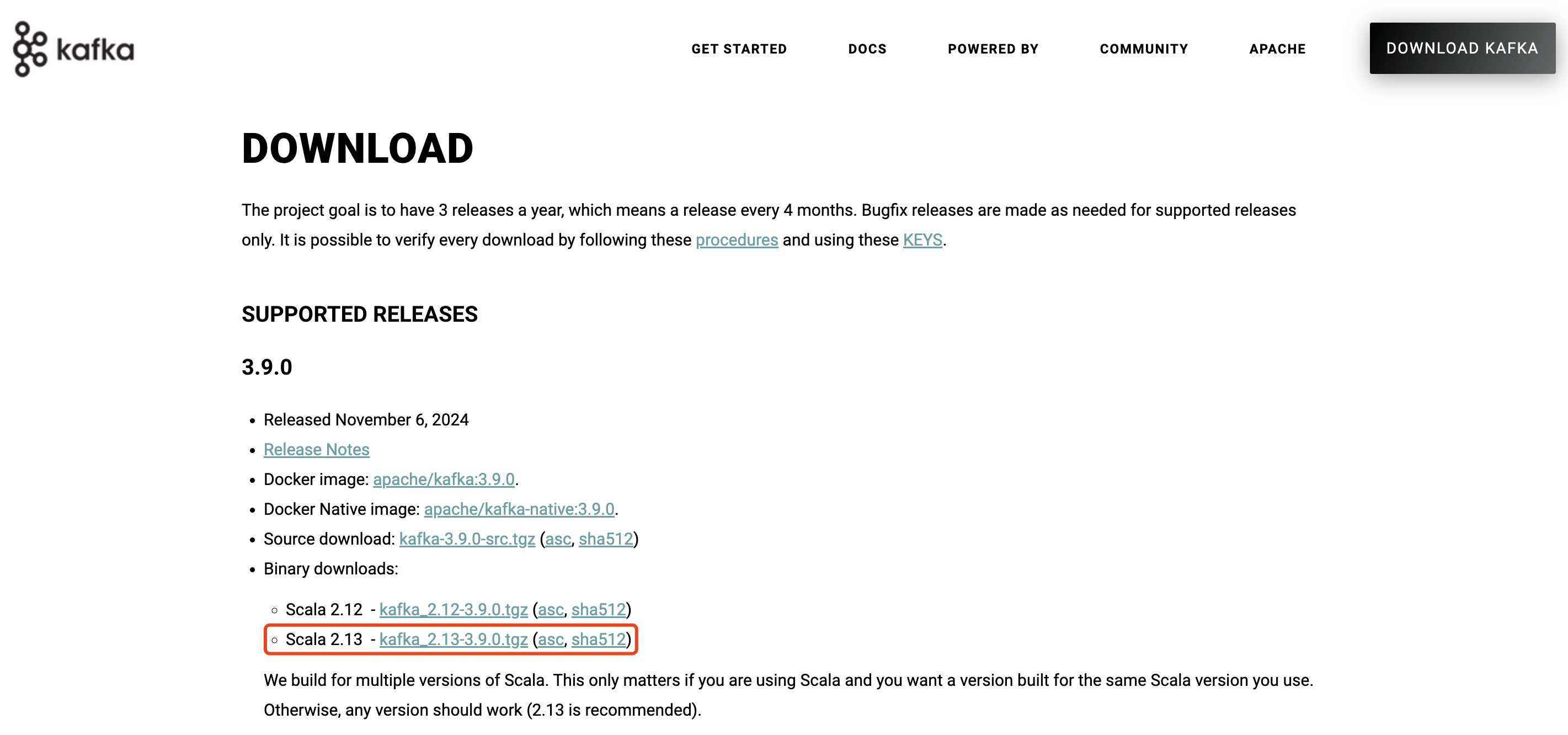
Add Kafka to your PATH. (I use zsh, so it’s configured in the ~/.zshrc for me)
export KAFKA_HOME=/Users/zjxjwxk/Library/kafka_2.13-3.9.0
export PATH=$PATH:$KAFKA_HOME/bin
Then run this command (if you are using a Linux-like OS):
source ~/.zshrc
Send Messages
Send messages by running Kafka Producer:
❯ kafka-console-producer.sh --bootstrap-server localhost:9092 --topic first_topic
>Hello
[2024-11-16 15:41:58,970] WARN [Producer clientId=console-producer] The metadata response from the cluster reported a recoverable issue with correlation id 7 : {first_topic=LEADER_NOT_AVAILABLE} (org.apache.kafka.clients.NetworkClient)
>Kafka
>I'm Xinkang
>
Receive Messages
Receive messages by running Kafka Consumer:
❯ kafka-console-consumer.sh --bootstrap-server localhost:9092 --topic first_topic --from-beginning
Hello
Kafka
I'm Xinkang
Display topics by Kafka REST Proxy:
❯ curl localhost:8082/topics
["first_topic"]%
Topics
Kafka Producers send messages to topics of Kafka Brokers:
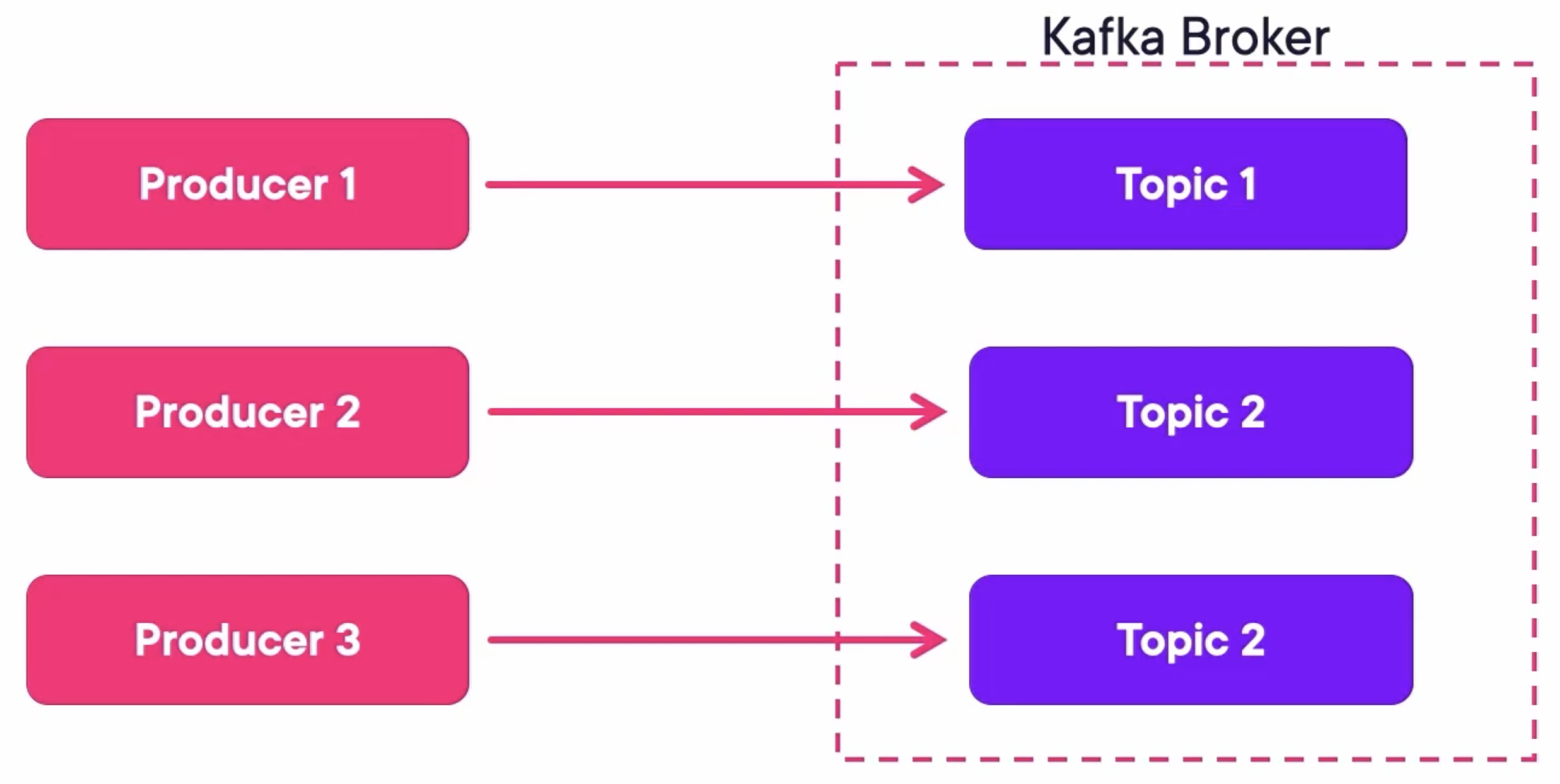
Retention Can Be Set To:
- Days: This means only keeping messages of up to N days and then deleting them.
- Bytes: This means only keeping messages until the topic has more than X bytes and then delete.
- None: This means storing all messages from the beginning of time.
Kafka Consumers consume messages from topics of Kafka Brokers:
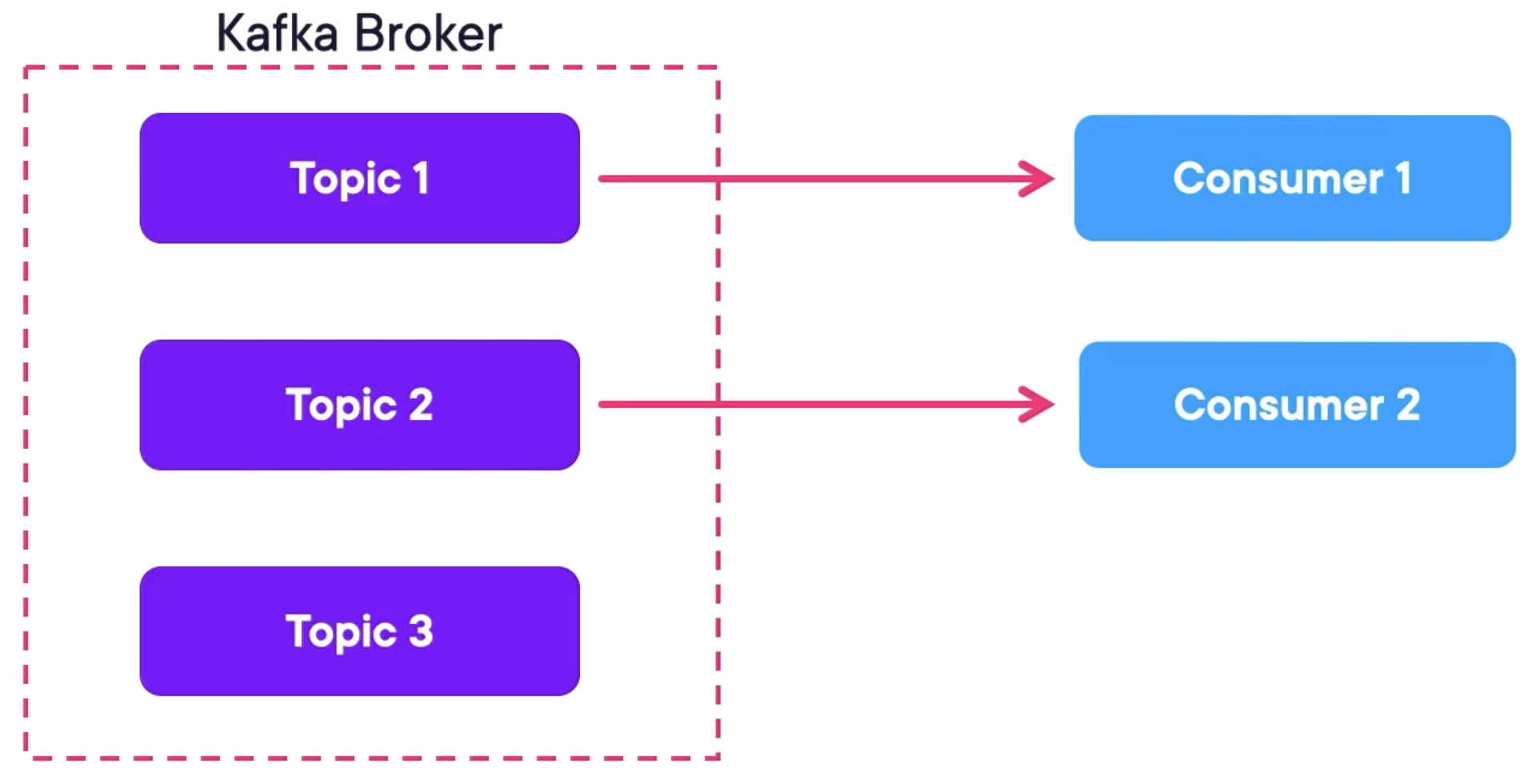
Partitions
A topic can be split into partitions and distributed within brokers in the cluster:
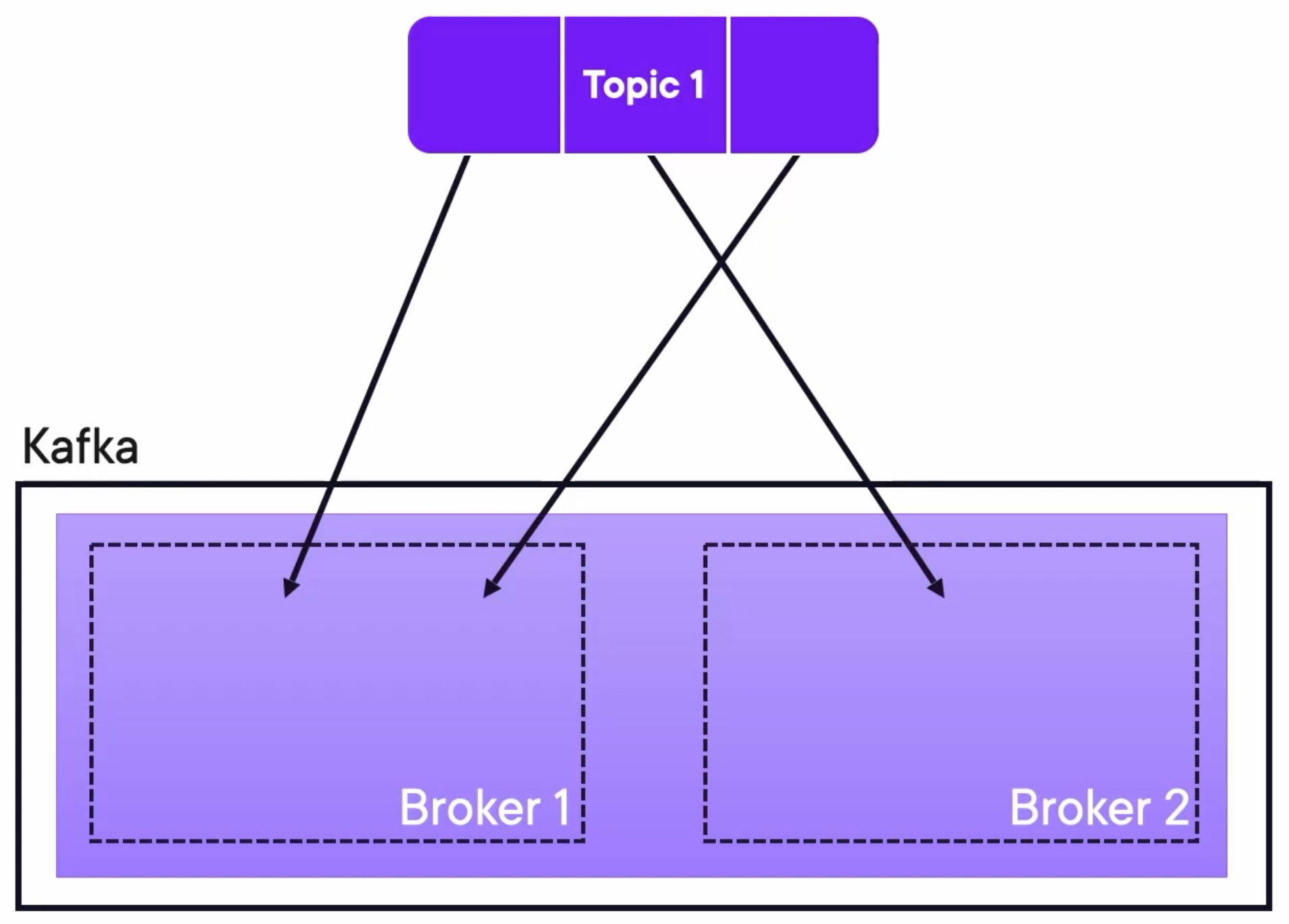
The partitioner uses the key to distribute the messages to the correct partition:
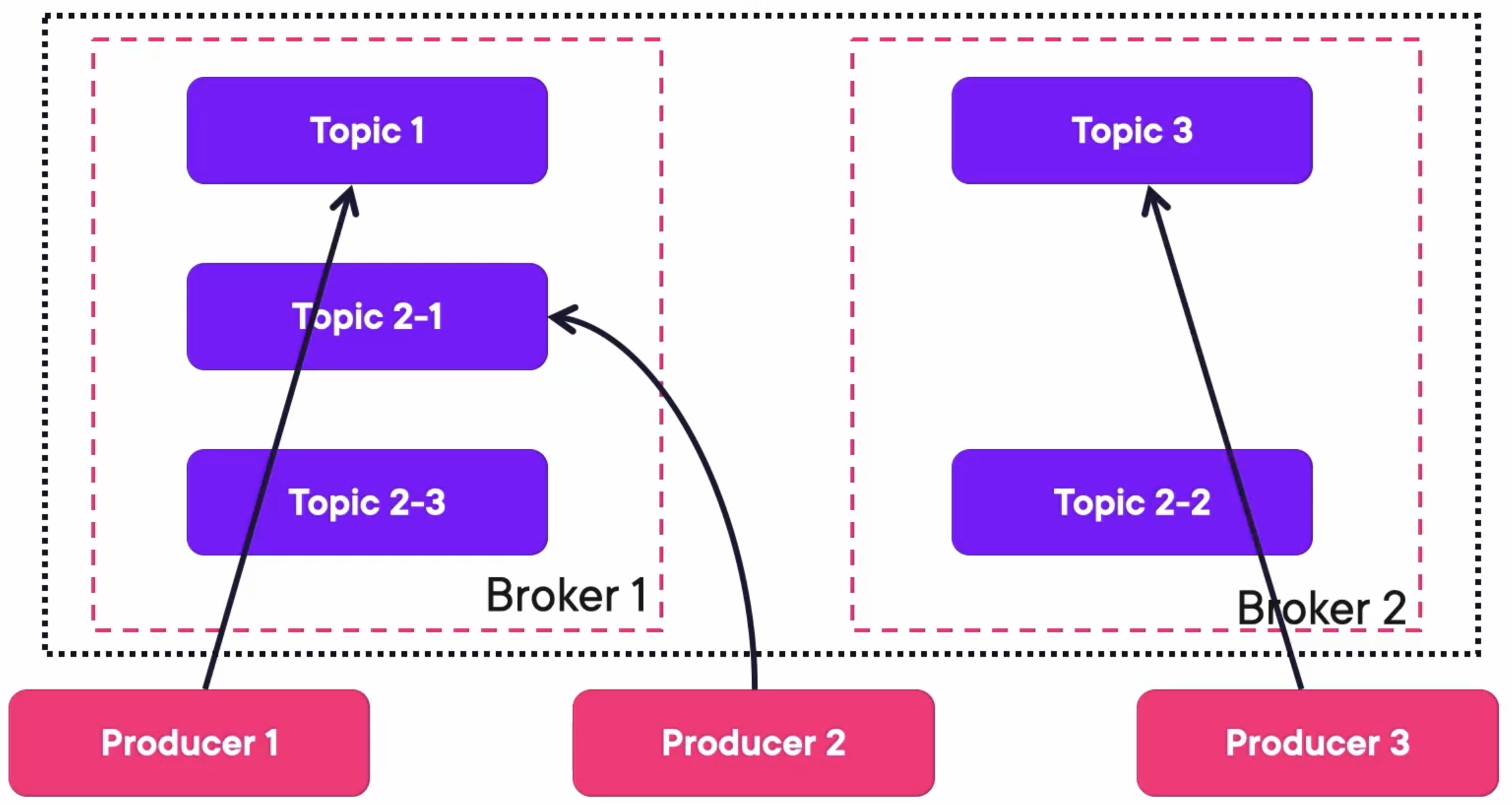
Consumer Read Scenarios
Consumer Offset: From the Beginning
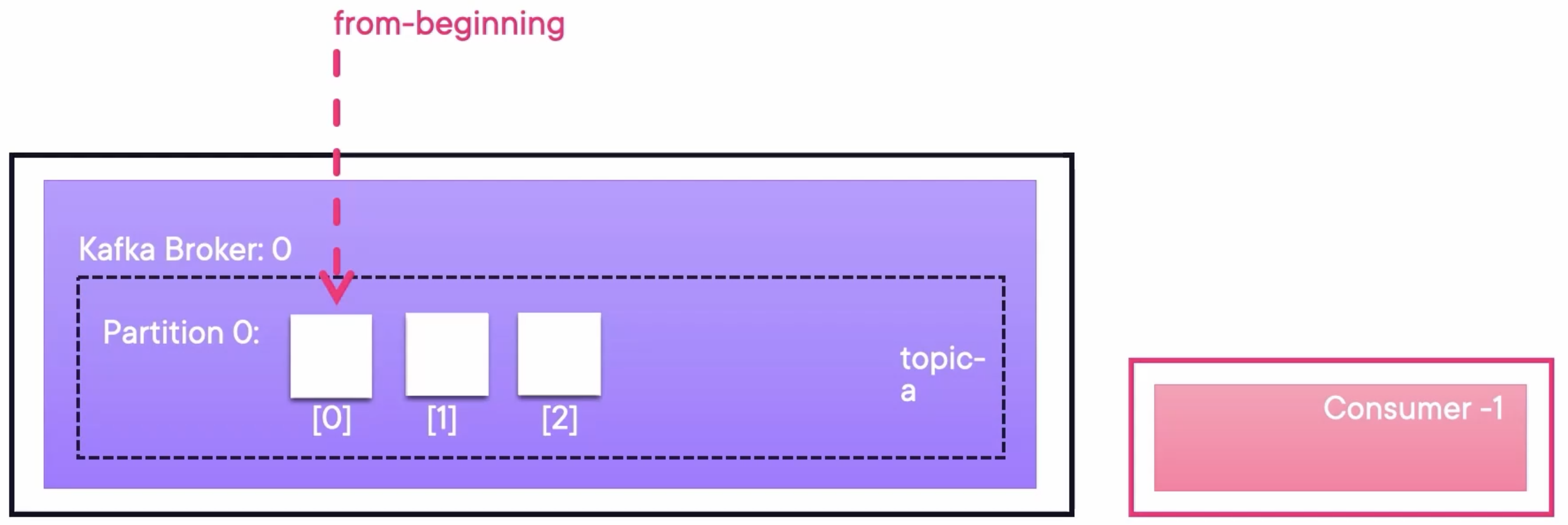
Consumer Offset: From the End
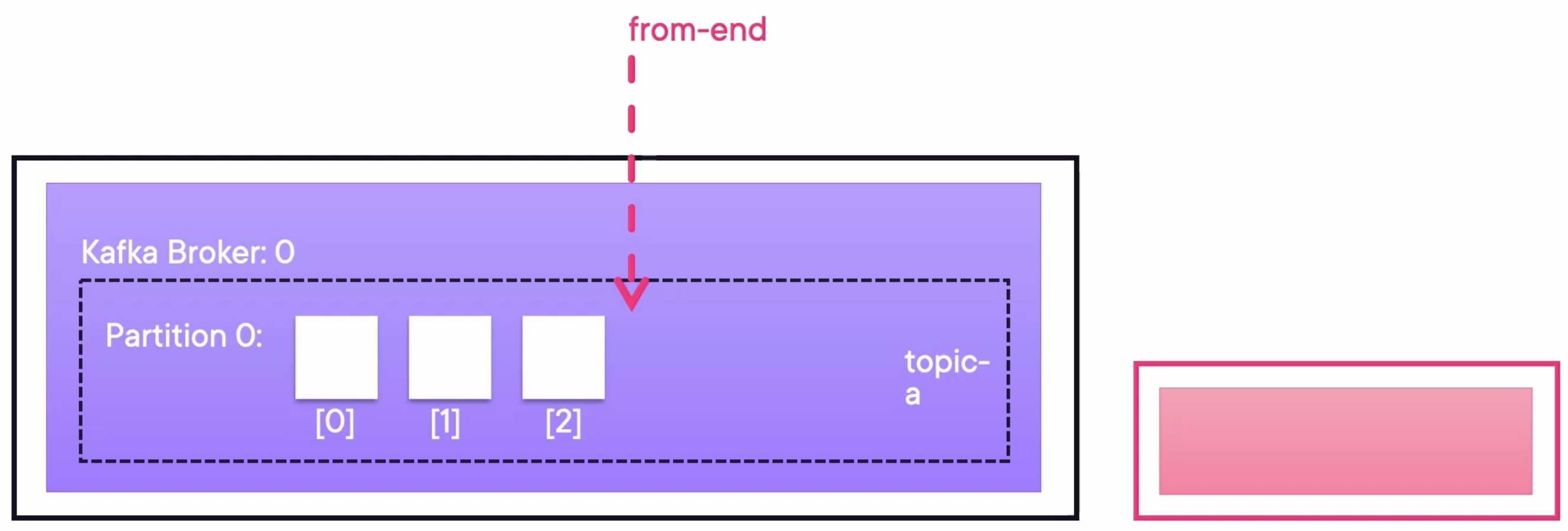
Consumer Offset: Already Have Been Here
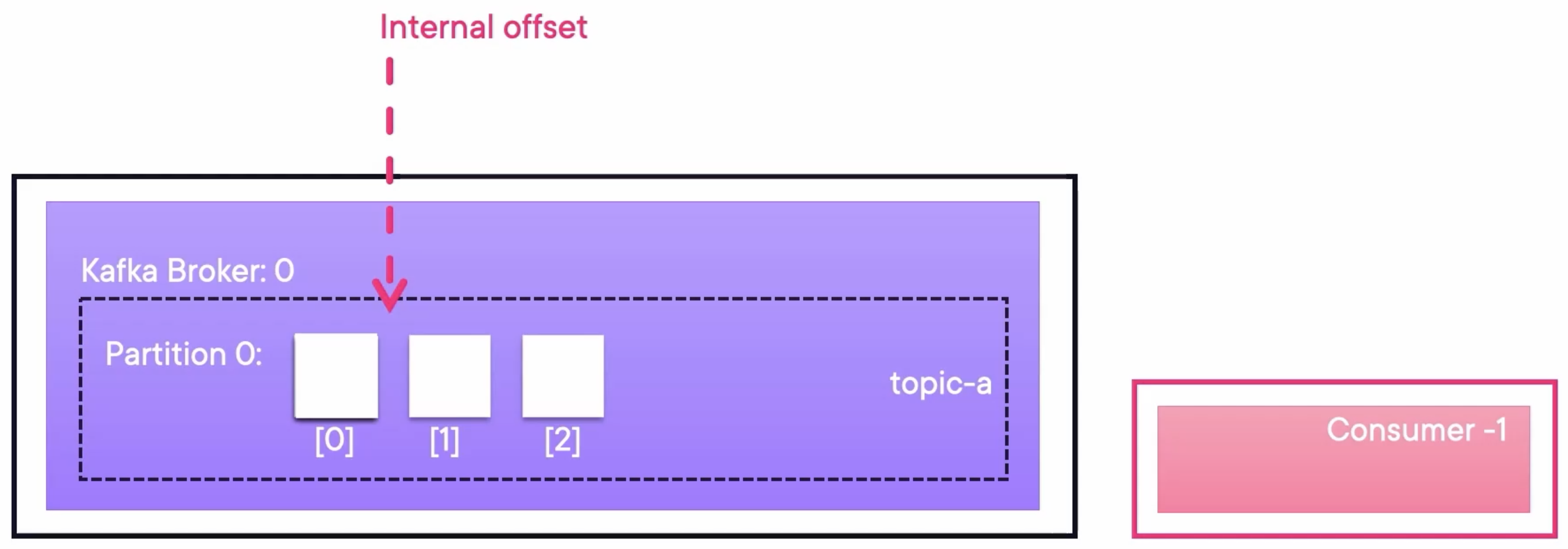
Summary:
- Topics can be partitioned.
- The partitioner uses the message key to redirect messages to partitions.
- Consumers read them from partitions and have an offset.
- Therefore, more partitions enable more consumers, which makes it more scalable.
Topic Replication
Each topic has a number called the replication factor, which replicates each partition of that topic:
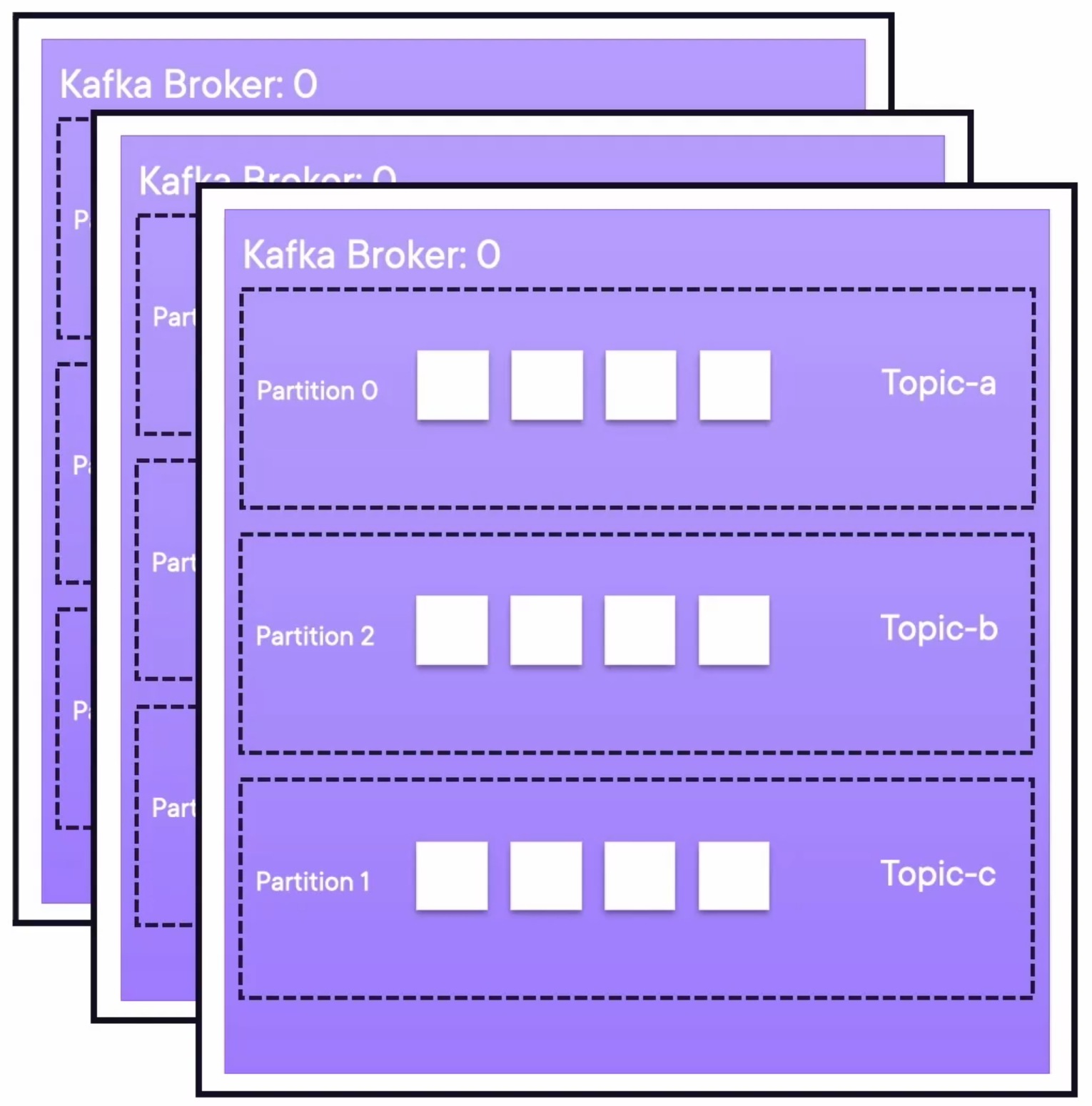
Each partition is on a different broker. Therefore, a single topic is scaled.
Demo: Interaction with Kafka via the REST Proxy
Run Kafka Containers
Run composed containers (if not):
docker compose up -d
Import Postman Collection
Use this Open API yaml for Kafka REST Proxy: https://github.com/axel-sirota/getting-started-kafka/blob/main/rest_proxy.yaml, which provides RESTful interfaces to a Kafka cluster.
We can import this yaml to the Postman as a collection:
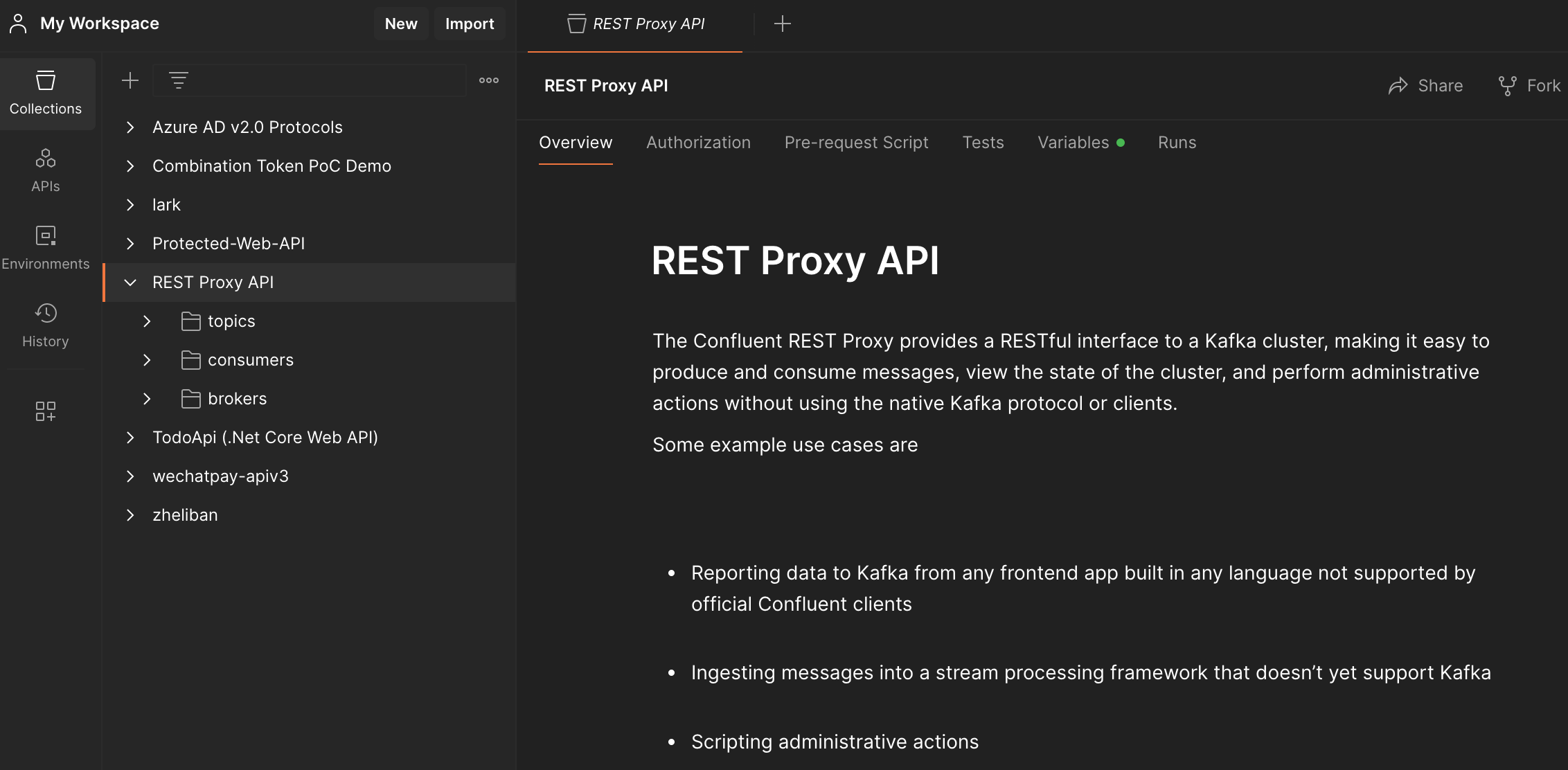
Then, add an environment for variables like baseUrl and use the environment.

Create Topic
Create a topic myorders with one replication and three partitions:
kafka-topics.sh --create --bootstrap-server localhost:9092 --replication-factor 1 --partitions 3 --topic myorders
The created topic can be displayed by calling {{baseUrl}}/topics/:topicName via Postman. The path variable :topicName should be myorders. The response will be like:
{
"name": "myorders",
...
"partitions": [
{
"partition": 0,
"leader": 1,
"replicas": [
{
"broker": 1,
"leader": true,
"in_sync": true
}
]
},
{
"partition": 1,
"leader": 2,
"replicas": [
{
"broker": 2,
"leader": true,
"in_sync": true
}
]
},
{
"partition": 2,
"leader": 3,
"replicas": [
{
"broker": 3,
"leader": true,
"in_sync": true
}
]
}
]
}
This is a pretty fragile scenario because if any broker goes down, there is no replica.
Increase Replication
Prepare a json file increase-replication.json for reassigning partitions of topic myorders:
{"version":1,
"partitions":[
{"topic":"myorders","partition":0,"replicas":[1,2]},
{"topic":"myorders","partition":1,"replicas":[1,2]},
{"topic":"myorders","partition":2,"replicas":[2]}
]
}
Reassign partitions with the json file:
kafka-reassign-partitions.sh --bootstrap-server localhost:9092 --reassignment-json-file increase_replication.json --execute
Then, we can see the replication of partition 0 and 1 are increased, and a leader is elected for each replica.
{
"name": "myorders",
...
"partitions": [
{
"partition": 0,
"leader": 1,
"replicas": [
{
"broker": 1,
"leader": true,
"in_sync": true
},
{
"broker": 2,
"leader": false,
"in_sync": true
}
]
},
{
"partition": 1,
"leader": 2,
"replicas": [
{
"broker": 1,
"leader": false,
"in_sync": true
},
{
"broker": 2,
"leader": true,
"in_sync": true
}
]
},
{
"partition": 2,
"leader": 2,
"replicas": [
{
"broker": 2,
"leader": true,
"in_sync": true
}
]
}
]
}
Stop a Broker
Stop the broker 2 to test the system resilience.
docker stop broker-2
We can see that for partitions 0 and 1, the broker 2 is not in_sync. For partition 2, the leader is -1, which means there is no leader and cannot take any new message.
{
"name": "myorders",
...
"partitions": [
{
"partition": 0,
"leader": 1,
"replicas": [
{
"broker": 1,
"leader": true,
"in_sync": true
},
{
"broker": 2,
"leader": false,
"in_sync": false
}
]
},
{
"partition": 1,
"leader": 1,
"replicas": [
{
"broker": 1,
"leader": true,
"in_sync": true
},
{
"broker": 2,
"leader": false,
"in_sync": false
}
]
},
{
"partition": 2,
"leader": -1,
"replicas": [
{
"broker": 2,
"leader": false,
"in_sync": true
}
]
}
]
}
Try to send messages to the topic myorders by running Kafka Producer:
❯ kafka-console-producer.sh --bootstrap-server localhost:9092 --topic myorders
>Hello
>again
>from
>Wxk
And try to receive messages from topic myorders:
kafka-console-consumer.sh --bootstrap-server localhost:9092 --topic myorders --from-beginning
We will find there is no response returned. The topic will be offline if one partition doesn’t have any replica online.
Restart the Broker
If we restart the stopped broker, Kafka will self-heal:
docker compose up -d
We can see that for partitions 0 and 1, broker 2 is in_sync again. And for partition 2, the leader 2 is elected again.
{
"name": "myorders",
...
"partitions": [
{
"partition": 0,
"leader": 1,
"replicas": [
{
"broker": 1,
"leader": true,
"in_sync": true
},
{
"broker": 2,
"leader": false,
"in_sync": true
}
]
},
{
"partition": 1,
"leader": 1,
"replicas": [
{
"broker": 1,
"leader": true,
"in_sync": true
},
{
"broker": 2,
"leader": false,
"in_sync": true
}
]
},
{
"partition": 2,
"leader": 2,
"replicas": [
{
"broker": 2,
"leader": true,
"in_sync": true
}
]
}
]
}
Then we can receive messages successfully:
❯ kafka-console-consumer.sh --bootstrap-server localhost:9092 --topic myorders --from-beginning
Hello
again
from
Wxk